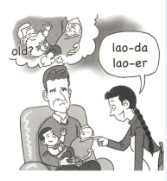In Chinese, adjectives like "little" and "old" don't always mean little and old. Sometimes they mean just the opposite. When we had our second child, our ayis nicknamed them "No. 1" and "No. 2". In Chinese, they are called lao-da, "the old and big one", and lao-er, "old number two", respectively. The ayis, however, are called by their surname with a prefix of "little." So, Bryan thought it was quite funny that the babies in the house are called "old" and the older people are called "little".

Explanatory Note
Actually, the prefix "xiao" or little is an endearing term given to people with whom you are familiar. It indicates the person is young, small in stature, or inferior in social position. The prefix "lao" or old also indicates familiarity. A person is called "lao" when he is older or more senior in position. Some- times, however, "lao" is used humorously. For example, foreigners of European descent are called laowai,"good-old-foreigners!"
(selected from 101 Stories for Foreigners to Understand Chinese People by Yi S. Ellis and Bryan D. Ellis, published by China Intercontinental Press in 2012)
